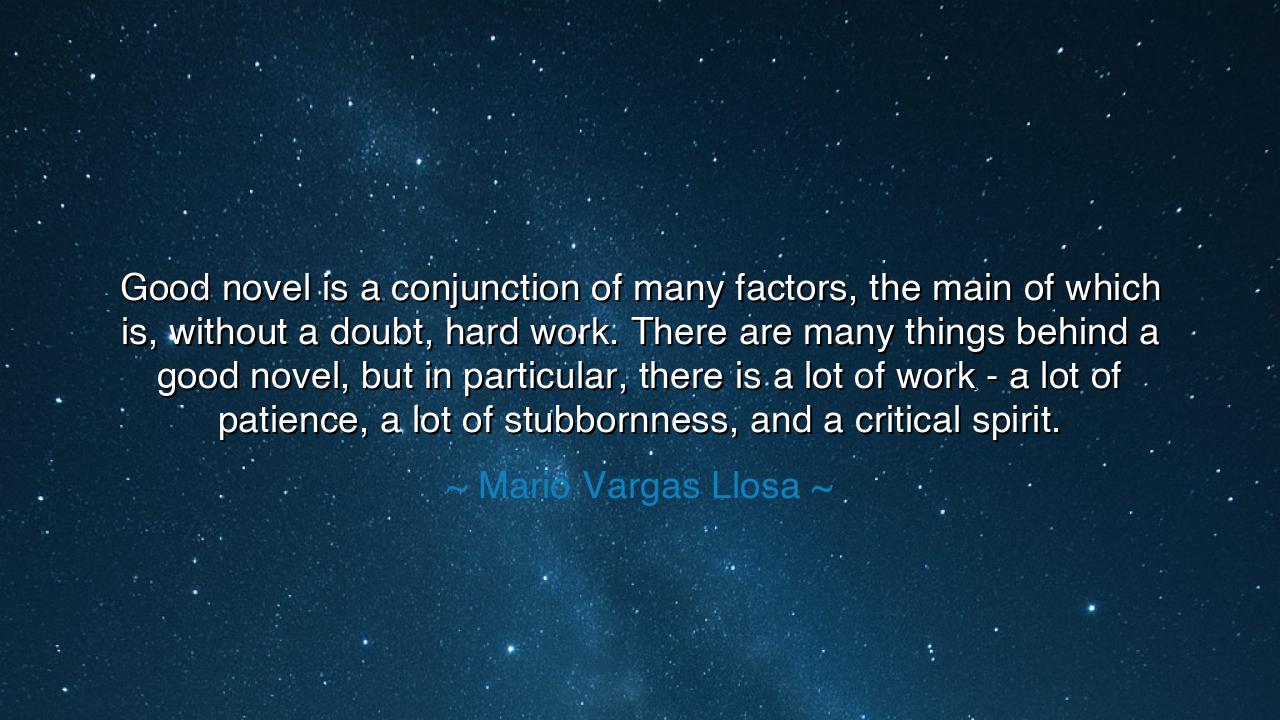
Good novel is a conjunction of many factors, the main of which
Good novel is a conjunction of many factors, the main of which is, without a doubt, hard work. There are many things behind a good novel, but in particular, there is a lot of work - a lot of patience, a lot of stubbornness, and a critical spirit.






Hear the wisdom of Mario Vargas Llosa, who proclaimed: “A good novel is a conjunction of many factors, the main of which is, without a doubt, hard work. There are many things behind a good novel, but in particular, there is a lot of work – a lot of patience, a lot of stubbornness, and a critical spirit.” These words, though speaking of literature, shine forth as a teaching on all great endeavors. For the novel is not only a book of stories, but a mirror of human striving, and its creation reflects the eternal law of achievement: nothing noble is born without labor, endurance, and the fire of self-examination.
The ancients knew this truth well. Homer, if he truly walked among men, did not merely sing of heroes in a single night. His verses, like waves upon the sea, were shaped by countless repetitions, refinements, and the relentless pursuit of form. The marble statue of Phidias, the histories of Herodotus, the philosophies of Plato—each stands not as a gift of inspiration alone, but as the fruit of hard work, patience, and the unyielding refusal to abandon the task when fatigue or doubt crept in. So too does Llosa remind us that the novel, like all lasting creations, demands not only talent, but persistence.
He speaks also of patience. The seed does not grow into a tree in a single season, nor does a sentence ripen into beauty in its first draft. The writer must sit long hours in solitude, weighing words as a jeweler weighs gems, shaping sentences as a mason lays stones. Impatience destroys the craft, leading to hastiness, weakness, and emptiness. But patience, though bitter, yields the sweet fruit of mastery. Here lies the hidden strength of the novelist: the courage to endure silence, delay, and long waiting, while the work takes shape at its own pace.
Yet stubbornness is also required, for the world is quick to discourage. The critics will scoff, the publishers will delay, and even the writer’s own heart will whisper, “Abandon this effort—it is too long, too hard.” But the stubborn spirit, like an oak in the storm, does not yield. Cervantes himself, before he gave the world Don Quixote, endured poverty, rejection, and ridicule. Had he not been stubborn, the greatest novel of Spain would never have been born. Llosa, too, knew this truth in his own journey: that the writer must cling to the task as a soldier to his shield, no matter the odds.
And what of the critical spirit? This, too, is indispensable. For the writer must be both creator and destroyer, both lover and judge of his own words. Without criticism, the work becomes flattery, shallow and weak. But with sharp and honest judgment, the novel is refined until it can endure the gaze of ages. So it is in all things: the craftsman must inspect his work, the leader must examine his choices, the soul must weigh its actions. Only through criticism, though painful, can greatness be born.
The lesson for us is clear: whether you seek to write, to build, to lead, or to love, remember that hard work is the root of all excellence. Do not expect greatness to come swiftly or easily. Embrace patience, for the path is long; embrace stubbornness, for obstacles will rise; embrace the critical spirit, for without it you shall never rise above mediocrity. The novel is but a symbol of this truth, a parable of creation that applies to all human labor.
Practical actions lie before you: when you begin a work, commit to finishing it. When obstacles come, do not abandon your task, but persist with stubbornness. When results delay, remind yourself that all growth takes time, and bear it with patience. And when your work is done, do not flatter yourself, but judge it with honesty, refine it, and begin again. This is the way of the true creator.
Thus let Llosa’s words echo across the generations: a good novel, like a good life, is forged from hard work, tempered by patience, fortified by stubbornness, and purified by the critical spirit. Follow this path, and your labor—whether in art, in craft, or in life—shall not only endure, but shine as a beacon for those who come after you.






AAdministratorAdministrator
Welcome, honored guests. Please leave a comment, we will respond soon